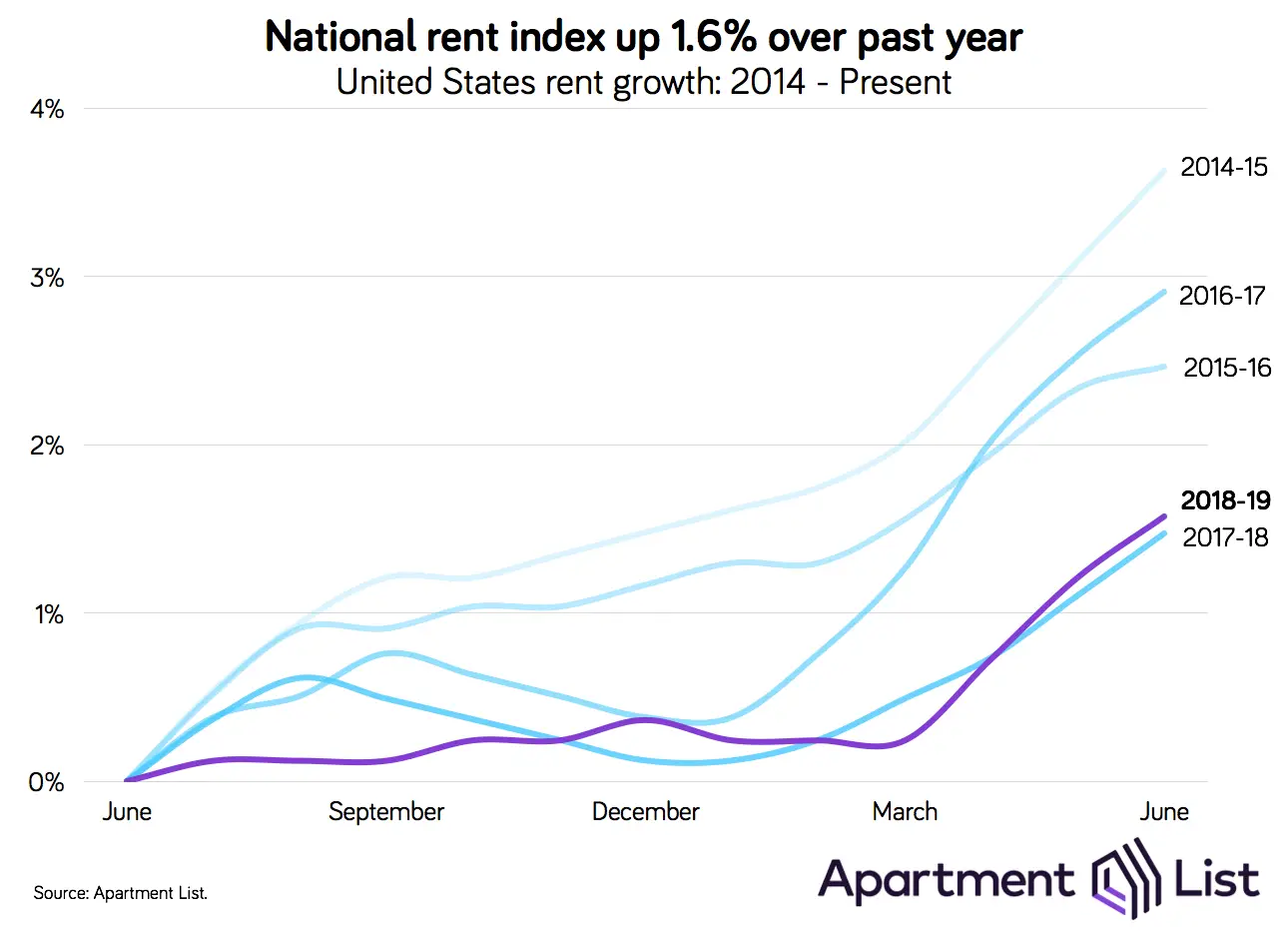Want to learn how you could legitimately live rent free?
Well, you're in luck because today I'll share 10 ways you can make that a reality.
New studies show that real estate and housing costs take away the biggest chunks of personal incomes, especially if you happen to live in a rented facility.
Rising demand in the rental market has pushed rents up by 3.5% per year, the fastest in over 30 years [1], while the real wage has remained relatively stagnant [2]. At the same time, budgeting advice about rent expense seems to be that it should be no more than 30% of one's income [3].
These figures show how tough it is for millennials to create personal budgets with room for rent, along with a comfortable lifestyle these days. Some rent hacks can help cut your rent expense in half, but there are also a few legitimate ways you can live without paying rent altogether and basically live rent free (without having to buy a house) and that is what we discuss today.
Living Rent Free Saves a Lot of Money
By living rent free how much money could you save per year? Hint: It is a lot.
The average median cost of for a 2 bedroom apartment in the US is around $1,200 a month, according to a recent report from Apartment List.

By living rent free — you can save $14,400 a year or $72,000 every 5 years. Imagine what you can do with this extra money. Would you save for retirement, pay off your debts, or take that trip you have always wanted to?
Best part?
Once you start finding ways to live free — you can continuously do this year over year.
Ways To Live Rent Free

If you are wondering where you can live rent free — it can be anywhere. Here is a list of rent free living options for you:
1. Become a house sitter
When homeowners go on vacations or have to leave their houses unattended for some other reason, they will pay you to live on their premises in their absence. You may be responsible for the basic upkeep of the house, such as watering the lawn, taking care of pets, redirecting the mail, and of course, keeping burglars at bay. Depending on your contract, this may be considered a full-time or part-time job that has the perks of free accommodation.
2. House hack your way to free rent
House hacking is a great real estate investment strategy when owning multi-family rental properties, according to Auction.com. House hacking is when you live in one of the multiple units of your investment property as your primary residence, and have renters from the other units pay your mortgage and expenses
3. Elderly or live-in caretaker
Some older folks would rather live in their own home than stay at a nursing home, so what does this mean for you?
You can provide your services in exchange for a free room. Just know that you will probably provide basic services like chores and errands and a lot of compassion is required. You can learn more about these positions on sites like Craigslist or Facebook Marketplace.
4. Live in a van or caravan
Unlike the house sitter option, this rent-free accommodation requires a bit of investment and engineering abilities. We've seen movies of entire families living in recreational vehicles (RVs) but those are simply beyond the financial reach of a vast majority of millennials. A van, or even a caravan, however, is a lot more attainable.
You can buy an old van and restore it in a way that makes it habitable, adding a bed, storage space, a basic lighting system (solar panels, perhaps), a toolkit, cooking utensils, including a stove, eating area and anything else you fancy and have space for.
Many people get hooked to the freedom that comes with living in vans but this kind of arrangement has obvious downsides too. Your vehicle is your home and you need to know intricate details about maintaining both systems so you do not get stranded in the wrong place at the wrong time. Plus, living conditions are extremely cramped and can get unhygienic without proper upkeep. Lastly, what about the restroom and parking? These are all details that have to be carefully pre-planned, but it's not too big a task for the adventurous at heart.
For a bit of interesting reading, check out the story about Ken Ilgunas, the college student who secretly lived in a van on campus to make ends meet.
5. Make a boat your home
This rent free living option is a lot similar to the previous one. Instead of a home on wheels, you have a home with sails. Of course, you need to purchase a small sturdy boat and find an appropriate place by the pier to ‘park' it, making sure the spot is sheltered from strong winds and waves. This idea is not suitable for everyone because there are many issues to contend with:
- Motion sickness – even though you're not sailing in the open ocean, your boat is going to gently rock 24/7 during calm weather. When the wind picks up, the waves get stronger and may float your boat down the canal or river if the mooring pins get loose.
- Proximity to town – needless to say, this option is not going to work out if you don't live in a town with a river or canal passing through it.
- Routine work – you may save money on rent but you still have to buy fuel for the engine and lighting system. The batteries need to be maintained regularly, the deck needs to be swept clean every day, waste from the toilet must be drained daily and water pumps have to be serviced on a regular basis.
There is a lot of hassle involved for the sake of living rent free in a boat, so obviously, the motivation needs to be stronger than just saving money so you can truly enjoy the experience.
6. Live with relatives
In many cultures around the world, it is completely acceptable to live with your parents beyond the age of 18, or to reside with your relatives in another city or country for extended periods of time.
Sometimes, offering to pay rent may even be considered offensive because there is a strong sense of community in these cultures. You would probably feel like helping out around the house to show your gratitude and can always chip in with groceries, maintenance, chores or actually pay rent, provided your relatives are okay with it.
This is a convenient way to save money while you try to get on your feet after high school or college.
7. Get a job that comes with free accommodation
There are many kinds of jobs that offer free accommodation as a perk. Certain jobs in the real estate sector, like property managers, are allowed to live on-site as they handle daily operations of the property. This job can apply to both large scale real estate projects (like housing communities and apartment complexes) as well as small scale projects (like motels or hostels). The perk comes with a fair bit of responsibilities, such as tenant management, lease arrangements, rent collection, maintenance and so on, depending on your salary and terms of the contract.
Jobs from other sectors also offer similar benefits. For instance, if your work takes you to a foreign country, your expat employee package is likely to include free accommodation, where the company agrees to reimburse your rent expense or allocates money separately within your salary for this purpose.
8. Do chores in exchange for rent (Barter roommate)
I mentioned this tip earlier when discussing how living with your relatives can eliminate your rent expense, and how you may wish to help around the house with chores to show your appreciation. If you decide to share an apartment with others, offer to help around the place in exchange for not paying rent. You could cook food, do the laundry, buy the groceries, or anything else that your roommates agree upon.
Barter roommates are also called roommaids, and while the title doesn't sound glorious, your wallet will certainly feel happy as it fattens over the months.
9. Recover your rent through extra income
This isn't an entirely rent-free living option but it does help you reimburse your rent expense. You can list your space on Airbnb or sublet your apartment or home at a rate that offers a full recovery of your rent cost or a slight profit.
If you're having trouble finding tenants that can stay for 6 months to a year, try experimenting with short term leasing to tourists and holiday travelers via online marketplaces.
There are two things to consider here:
- Ensure sub-leasing is not against the terms of the contract with your landlord,
- Rent income is taxable so the tax amount should be factored into the rent you charge your tenants.
10. Couch surfing
By staying on the road and staying on strangers couches city to city, you can save on rent.
If you do not mind slumming it at times — then this is an ingenious way to save on rent. It is not difficult to find a couch to stay on either with sites like CouchSurfing.com.
If you are single and want to explore different states, this may be the perfect option for you.
Why You Should Always Negotiate Rent (And How to Do It Right)
If you went through the list above and couldn't find an option well suited for your lifestyle — you still can manage to afford rent by negotiating it.
If you have never negotiated rent, you need to learn why it can help you save money and how to negotiate rent on a house or rent before signing.
When most people hear the word negotiate, they automatically think about cars and business deals but rent does not come to mind.
In fact, most Americans do not know that they can negotiate the price of rent to get help with rent.
If you have never negotiated rent, you need to learn why you should negotiate on rent to save money. While it may not be living rent free, it still is worth it
Is Negotiating Rent Worth It?

If you have never haggled before, you might be feeling awkward about starting now. The results of your negotiation will vary depending on the location of the apartment and the amenities available. Because housing is expensive, saving a few dollars per month might mean bigger savings in the long run.
How to Negotiate Rent
The best way to negotiate rent is by making the landlord feel as if he is also winning; it is not about hustling your potential landlord out of money.
You can negotiate rent by doing the following:
1. Highlighting your strengths as a tenant
When you start looking for a new apartment, you should make a few concessions – signing a longer lease and paying several months’ rent in advance – to show your landlord that you are financially stable. If the rent goes up, you should remind your landlord what a good tenant you have been: being courteous to your neighbors and paying your rent on time. This will give him some incentive to keep your rent as it is.
2. Offer to end your lease during summer
Because finding tenants in the summer is much easier, you should offer to terminate your lease at that time for a lower rent. Offering to end your lease during the summer will be an attractive incentive for your landlord and he might agree to shave your rent price.
3. Be open to compromise
If you cannot or do not want to pay the current rent, you should suggest a lower amount that you can afford. For example, if the rent is a hundred dollars higher than you can afford, you could offer to pay fifty dollars instead. You can back up this offer by demonstrating your stability as a tenant.
4. Ask about lease extension
When you show that you plan to live in the apartment for a while, the landlord will see that you are a stable investment. For instance, if your lease is annual, you should offer to extend it by another year or two. When the property owner or manager sees that he will not have to deal with a new tenant for a while, he might reduce your rent.
5. Find out if the rent is negotiable
When hunting for apartments, you should ask your potential landlord whether the price of rent is negotiable. A big property company is less likely to negotiate the rent but an independent landlord might be willing to listen. If your apartment building is facing a price increase, you should bring up this topic a month before your lease ends to get enough time to make alternative plans.
6. Have alternative plans
When you are looking for a new apartment, you need to have more than one on your radar. It would be risky to choose one apartment and hope that the landlord will lower its rent. This is especially risky if you have already made plans to vacate your old premises.
Make sure that you choose at least three places that you would like to move to – this increases your chances of succeeding and getting lower rent.
Living Rent Free is Possible
The above tips will come in handy if you are looking to negotiate rent or live completely rent free. Any negotiation is tricky, especially if you do not want to offend anyone but these are just a few of the most common ways to live rent free. Have you ever followed any of these? Tell us how that worked out for you?
Sources:
[1] Joint Center for Housing Studies (Harvard University) – 2015
[2] Pew Research Center
[3] How Much Should You Spend on Rent When Budgeting?
- 1. Become a house sitter
- 2. House hack your way to free rent
- 3. Elderly or live-in caretaker
- 4. Live in a van or caravan
- 5. Make a boat your home
- 6. Live with relatives
- 7. Get a job that comes with free accommodation
- 8. Do chores in exchange for rent (Barter roommate)
- 9. Recover your rent through extra income
- 10. Couch surfing
- 1. Highlighting your strengths as a tenant
- 2. Offer to end your lease during summer
- 3. Be open to compromise
- 4. Ask about lease extension
- 5. Find out if the rent is negotiable
- 6. Have alternative plans







